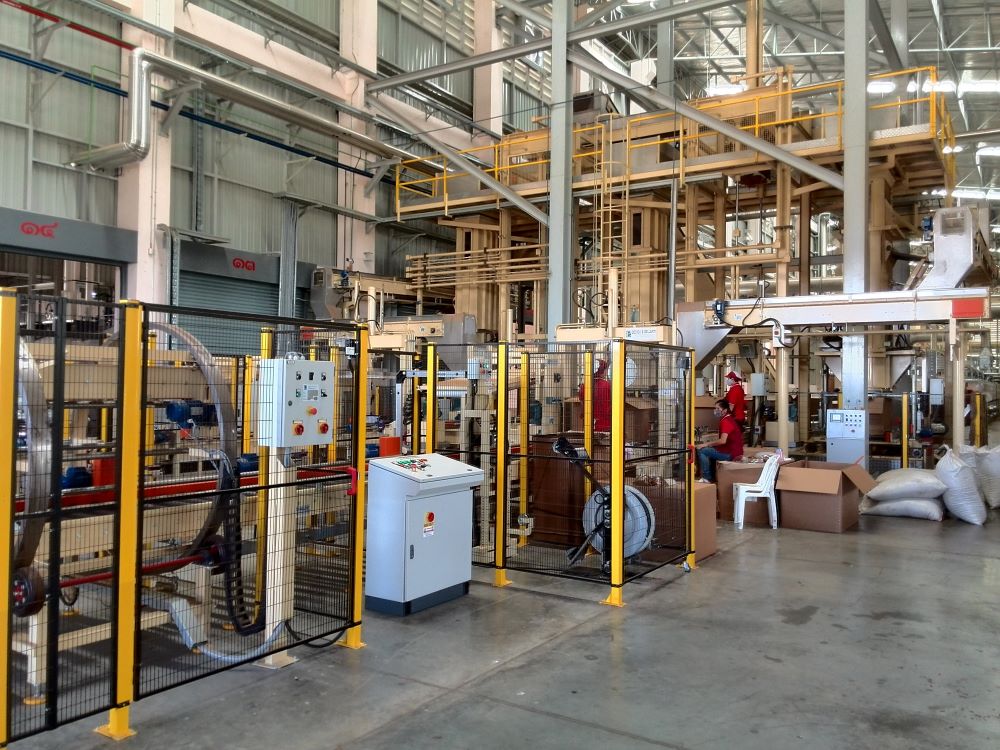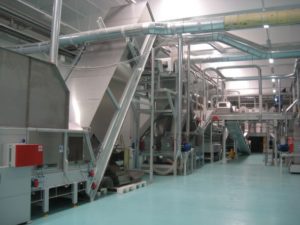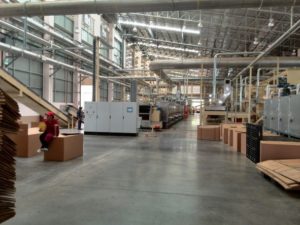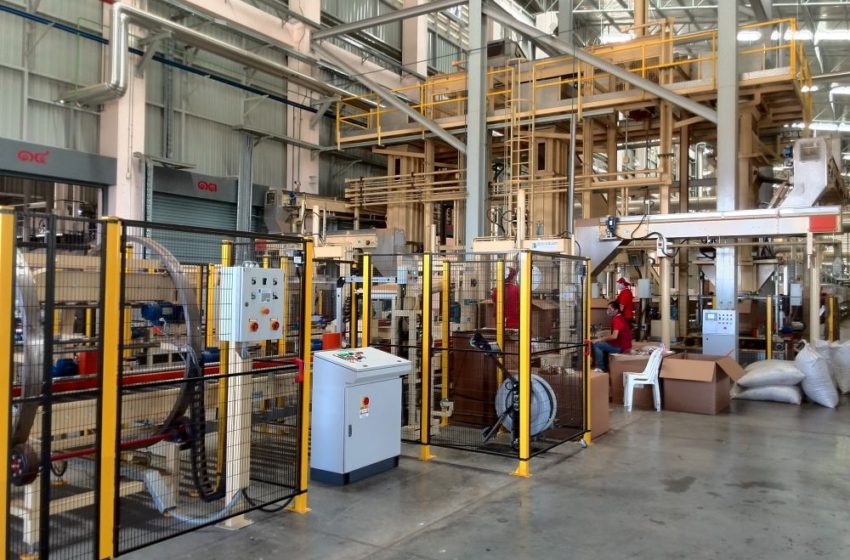
Celebrating 100 years in business, Godioli & Bellanti attributes its success to offering “quality machines at truly unbeatable prices.”
By George Gay

After three years of subdued demand for tobacco industry primary processing equipment, interest is picking up, according to Lorenzo Curina, chief executive officer and sales director at the primary machinery designer and manufacturer Godioli & Bellanti.
There was now increasing demand for complete processing lines that were compact and uncomplicated, a demand that was being driven by a growing interest in the production of cut rag, he said in an emailed reply to questions.
At the same time, there was a trend by major cigarette manufacturers to require the relocation and/or the refurbishment of existing equipment, projects for which Godioli & Bellanti, with its 100 years of experience in the business, was well qualified to undertake. The company’s engineering skills and experience enabled it to repair, rebuild, recondition or upgrade all types of primary equipment while its organizational skills and flexibility meant it could navigate the necessary logistics involved.
In fact, an indication of the engineering and logistical skills the company can call on was demonstrated when, in 2018, it shipped and delivered what was believed to have been one of the tobacco industry’s biggest direct conditioning cylinders, which was 14 meters long, 3 meters in diameter and capable of processing flue-cured Virginia tobacco at a rate of 20 tons per hour.
A Pioneer
Godioli & Bellanti was established in 1923 by Gino Godioli and Angelo Bellanti, whose initial focus was on making agricultural implements, especially those aimed at helping the mechanization of tobacco production, since the Umbria region, where they were based, was one of the most important areas in Europe for the cultivation of flue-cured tobacco.
After the passing of the founders, Godioli & Bellanti was, in 1963, turned into a limited company, which was the beginning of a transformation. Under its new designation, Godioli & Bellanti SpA, the company moved into new and challenging areas. It developed new technologies for the tobacco industry, becoming Italy’s first supplier of tobacco machinery to the tobacco manufacturing sector, which later included the multinational companies that established operations in Italy and elsewhere in Europe.
The transformed company specialized in turnkey projects, which meant that it supplied, as well as machinery, services such as heating and lighting systems. And this breadth of operation allowed it to gain considerable expertise in machine and whole-factory design.
Initiatives such as these have been continued and are continuing. Although the company is known for its tobacco industry services, it operates in other industries, most of them natural outcrops. It offers machinery and processing lines for medicinal herbs and other plants, including mechanized equipment for the cultivation of these plants, along with machinery for drying and dehydrating; cutting, threshing and classification; and mixing and blending. It offers, too, continuous drying plants for food products.
Entering New Fields

Meanwhile, the company’s experience in the field of herbs was adapted to allow it to enter the field of industrial hemp processing, where its processing lines provide for the separation of the plant’s fiber, hemp, seeds, flowers, leaves and stems. This is an important and growing side of the business because the products that are generated are used in a wide range of industries, including those concerned with pharmaceuticals, textiles, foodstuffs, veterinary products and bio-building. Less well-known, perhaps, is the company’s work with tree seeds. It was the first company to develop a tree seed extraction system, and it now offers complete, custom-designed turnkey plants for the extraction and selection of tree seeds.
Aside from its interests in food and related products, the company offers biomass driers that function with recovered thermal energy, including driers for woodchips and sawdust. And it offers machines and complete processing lines for producing glass-reinforced pipes and sleeves, using continuous filament winding technology.
Custom Offerings

But a large part of its business is concerned with tobacco, for which it can supply equipment for auxiliary plants, threshing lines and, of course, primaries. For auxiliary plants, where the leaf tobacco process begins, Godioli & Bellanti is able to offer, among other items, conveyor belts, picking lines, feeding and blending tables, tipper feeders, tipping machines, weighing belts, vibrating conveyors, vibrating sieves, pneumatically operated pad looseners, sand reels, blending silos and ordering cylinders along with test shakers, stem testers, laboratory mills and laboratory cutters.
For many years now, it has been a goal of most leaf processors to implement changes aimed at increasing packed-tobacco quality, costs and yields, and, to this end, Godioli & Bellanti offers custom-designed threshing lines and plants, including, among a host of other equipment, high-efficiency threshers operating over a wide range of speeds and compact classifiers with low energy requirements. It provides, also, compact, high-efficiency re-driers with steam recycling systems that reduce steam consumption. Being custom designed, the re-driers provide for a wide range of adjustments in such areas as, but not limited to, drying temperatures, humidifying steam pressures and apron conveyor speeds. Finally, Godioli & Bellanti offers complete, automatic, programmable leaf tobacco packing lines for cartons, wooden boxes, zipper bags and bales.
Meanwhile, it is probably the case that the company is best known for its primary machinery and plants—particular plants at that. Curina told Tobacco Reporter that companies that contacted Godioli & Bellanti were those who preferred “traditional primary processing—I would say almost artisanal.” Such equipment includes automatic handling systems for cartons and bales, automatic de-cartoners, automatic vertical slicers, pneumatic conveying systems, weighing belts, dosing feeders, tipping feeders, blending and storage silos, toasters, sauce and flavor kitchens, casing and flavoring cylinders, drying cylinders for cut rag, and customized supervision software to render whole lines automatic.
Finally, Curina further defined his company’s approach to business. “We don’t presume to compete with the big primary machinery manufacturers for the very big projects,” he said, “but we modestly offer quality machines at truly unbeatable prices.”
This strategy seems to have paid off, not surprisingly, perhaps, given that the recent past has seen an increasing trend—at least outside China—toward shorter cigarette-manufacturing runs, a trend that has been reflected in primaries as a need to produce smaller batches of cut rag. There has been a rise, too, in the number of small, independent primary operators catering to multiple end users that need to run low-cost, highly flexible operations from small footprints. Certainly, Curina, and his brother Cesare, president of the board and technical director, who have steered the company’s direction in recent years, have made much progress—modestly expressed. A note on the company’s website describes how “Godioli & Bellanti works in several areas of the world,” before going on to list almost 60 countries and every continent.












